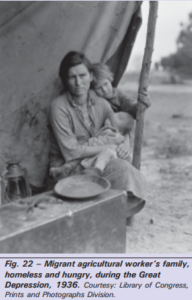The NCERT Solution For Class 10 History Chapter 4 – “The Making of a Global World” provides detailed answers to all the questions in the chapter. This chapter traces the history of globalization, exploring how the world became interconnected through trade, migration, and colonization. It covers key periods such as the pre-modern world, the emergence of the Silk Route, the age of industrialization, and the rise of the global economy.
NCERT Solution For Class 10 History Chapter 4 – The Making of a Global World

Here Are The NCERT Solution For Class 10 History Chapter 4
- Give two examples of different types of global exchanges which took place before the seventeenth century, choosing one example from Asia and one from the Americas.
Ans: The following are instances of various global exchanges that occurred prior to the seventeenth century:
• Gold was traded for textiles and spices by nations in Asia and Europe.
• During the Colonial era, food and gold were traded between America and the European countries.
NCERT Solution For Class 10 History Chapter 4
- Explain how the global transfer of disease in the pre-modern world helped in the colonisation of the Americas.
Ans: Native people from other countries outside of Europe were susceptible to the diseases, but Europeans were not. Their population suffered as a result of having to battle from within when they contracted the diseases, which depleted their resources and made them weaker. Thus, colonisation by Europeans was not difficult.
- Write a note to explain the effects of the following:
(a) The British government’s decision to abolish the Corn Laws.
Ans: The removal of maize laws caused British farmers to relocate to cities, pursue other careers, and ultimately contribute to rapid industrial growth.
(b) The coming of rinderpest to Africa.
Ans: The rinderpest epidemic decimated African livelihoods, which facilitated European colonisation of the continent.
NCERT Solution For Class 10 History Chapter 4
(c) The death of the working age in Europe because of the World War.
Ans: As a result of the young men who lost their lives in the World Wars, women began to work and gained more social status.
(d) The Great Depression on the Indian economy.
Ans: Farmers in India lost money during the Great Depression as a result of a sharp decline in export prices. A few years later, Indian independence was made possible by the British Government’s failure to lower taxes, which caused widespread unrest in India.
NCERT Solution For Class 10 History Chapter 4
(e) The decision of MNCs to relocate production to Asian countries.
Ans: The shifting of production to Asian nations resulted in massive economic growth and a rise in employment. Global Production Networks were established as a result of the West’s prosperity and the MNCs’ rising profits.
NCERT Solution For Class 10 History Chapter 4
- Give two examples from history to show the impact of technology on food availability.
Ans: The two historical examples that demonstrate how technology affects food availability are as follows:
The cost of food was reduced by the rapid transportation of food made possible by larger ships, lighter waggons, and faster railroads.
Transporting perishable goods to distant countries was made easier by refrigerated ships.
NCERT Solution For Class 10 History Chapter 4
- What is meant by the Bretton Woods Agreement?
Ans: In order to maintain employment in industrialised nations and global economic stability, the World Bank and the International Monetary Fund were established through the signing of the Bretton Woods Agreement in July 1944 at Bretton Woods in New Hampshire, USA.
- Imagine that you are an indentured Indian labourer in the Caribbean. Drawing from the details in this chapter, write a letter to your family describing your life and feelings.
Ans: Here’s an example of a letter:
To My Family Members:
I hope everyone is doing well and having a great time there. I am an indentured labourer in the Caribbean, and this letter is all about my life there.
It was surprising to find that life was so difficult here when I first arrived. I do, however, have high hopes of recovering quickly. I did not choose all of this, despite the fact that life is difficult and full of challenges here. Only on the basis of fabrications and promises was the contract made lucrative. I don’t make much money and am treated like a slave here. But I think that this will soon pass.
Manish, Your Son.
NCERT Solution For Class 10 History Chapter 4
- Explain the three types of movements or flows within international economic exchange. Find one example of each type of flow which involved India and Indians, and write a short account of it.
Ans: Trade, human capital flows, and other movements are the three categories of movements or flows that comprise the international economic exchange.
• Capital Movements
American foods such as potatoes, soy, groundnuts, chillies, and so forth were brought to India.
British colonial dominance resulted from the use of indentured labour for factories, plantations, and mines abroad.
Britain borrowed a large amount of money from the United States to finance World War I. Since India was an English colony, both the Indian people and the economy were impacted by these loans.
NCERT Solution For Class 10 History Chapter 4

- Explain the causes of the Great Depression.
Ans: The United States experienced a rise in income and prosperity despite the effects of World War I being minimal, which led to the Great Depression.
- Inflation increased as a result of the 1929 stock market crash, which terrified investors and depositors because they lost money and began to accumulate wealth. This also led to an increase in demand and decreased production.• Banks closed, making it difficult for businesses to obtain funding for investments.
- Explain what is referred to as the G-77 countries. In what ways can G-77 be seen as a reaction to the activities of the Bretton Woods twins?
Ans: The acronym for the group of 77 nations that sought a new global economic structure that would grant them greater authority over their natural resources is G-77. The International Monetary Fund and the World Bank were created to serve the financial needs of only industrialised and developed nations, so the G-77 was a response to the actions of the Bretton Woods twins.
NCERT Solution For Class 10 History Chapter 4
For the Next Chapter Solution Click Below
CHAPTER 1 – The Rise of Nationalism in Europe
CHAPTER 2 – The Nationalist Movement in Indo-China
CHAPTER 3 – Nationalism In India
CHAPTER 4 – The Making of a Global World
CHAPTER 5 – The Age of Industrialisation
CHAPTER 6 – Work, Life and Leisure
For more updates, you can follow us on our social media

